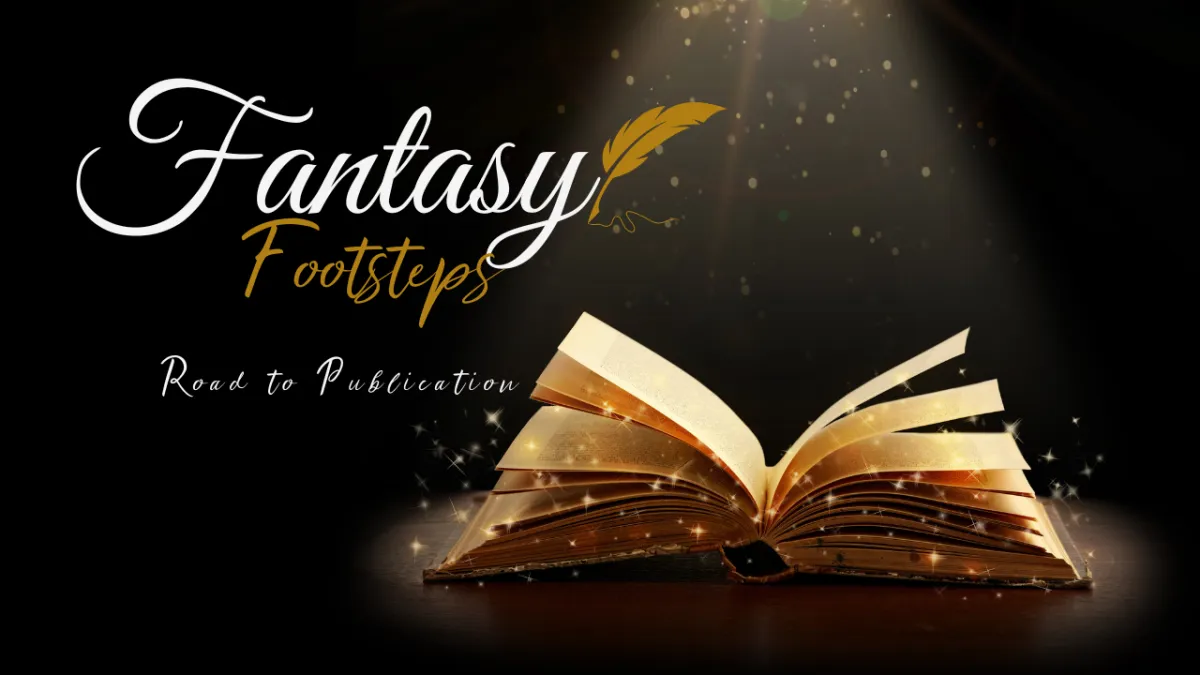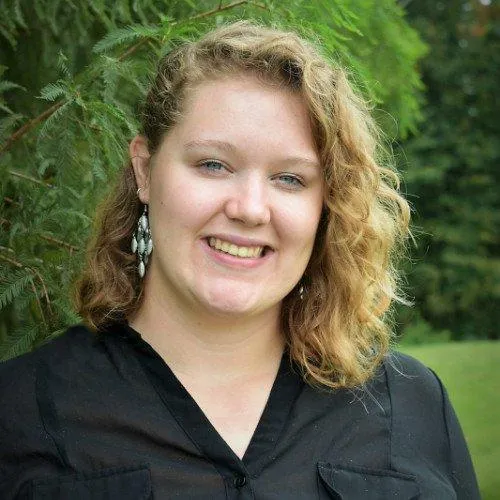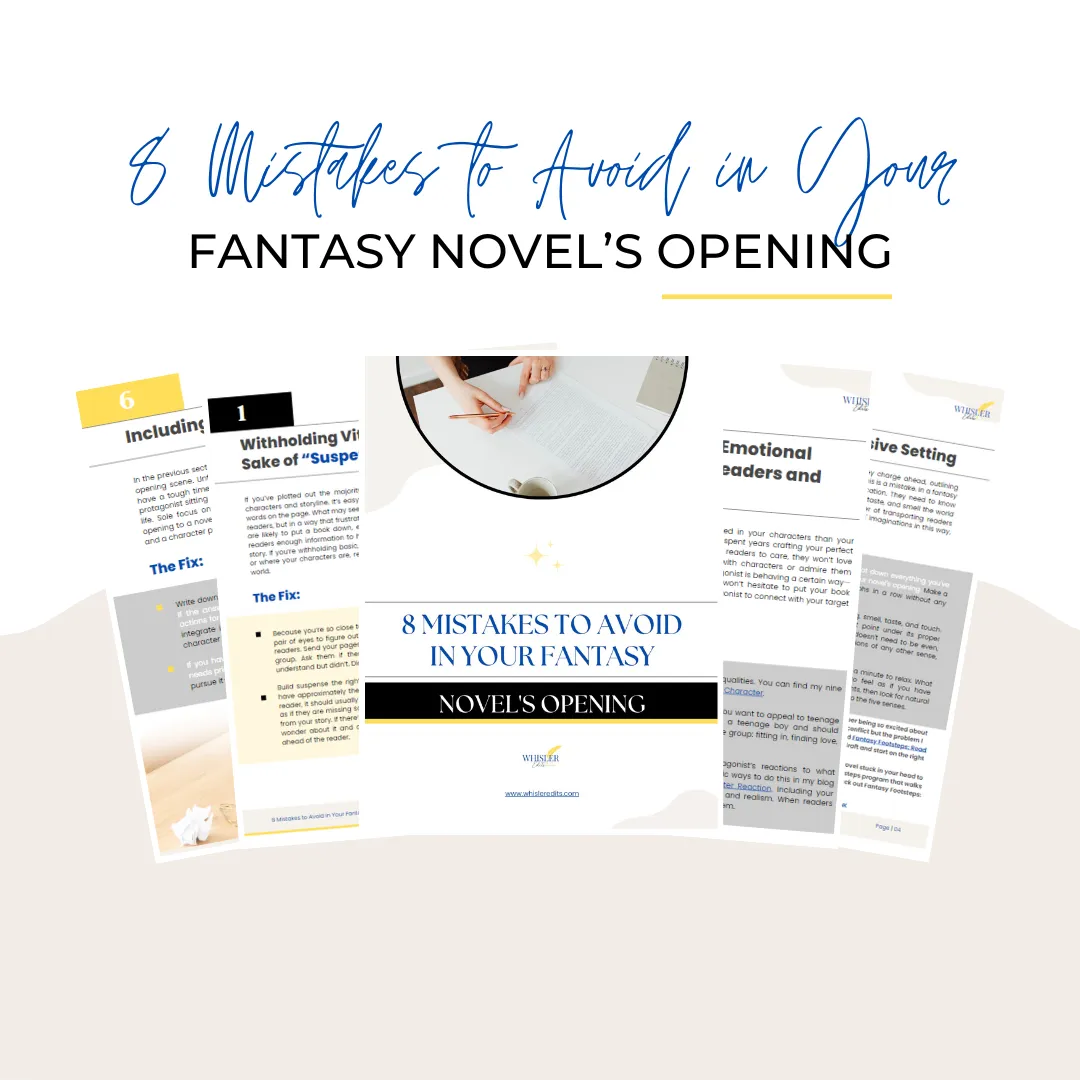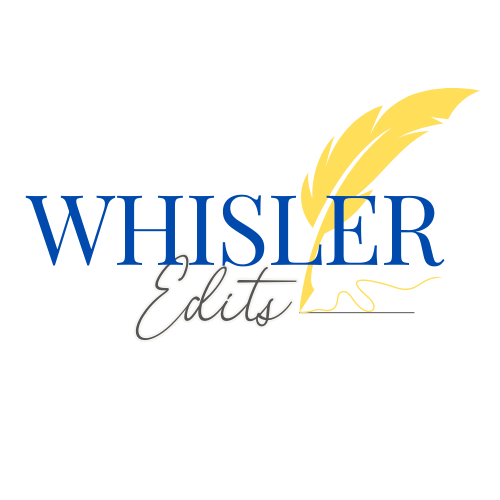8 Mistakes to Avoid
in Your Fantasy Novel’s Opening
Don’t let common mistakes lose your readers!

Your Novel Matters ...
Looking for the right book coach for your fantasy novel?
Are you a fantasy writer …
… struggling to convert the vivid scenes of your fantasy novel from your imagination to the page?
… stuck in a loop where you constantly rewrite your opening pages?
… worried your story won’t resonate with your readers?
What if I could show you the exact steps week to week that would take you from brainstorming and drafting to revising and publication?
I specialize in developmental editing and book coaching for writers of fantasy novels—writers who value the craft of storytelling and wish to create stories that resonate.
My Services
Develop Your Ideas
Fantasy Footsteps: Road to Publication

I’ll let you in on a secret. All you need to succeed as a writer are three things:
A Roadmap: Illuminate your path with a step-by-step guide, ensuring you achieve your writing goals every week. From outlining to publishing, every stage of your journey is mapped out for success.
Mindset Mastery: Learn how your thoughts control your outcomes in your writing. Overcome self-doubt and unearth the confidence that will bring your unique ideas to life on the page.
Personalized Support: Prepare for comprehensive assistance, real-time accountability, and feedback tailored to your needs. From brainstorming sessions to final publication, you'll have a dedicated ally guiding you every step of the way.
With these three pillars, you'll unlock the potential to:
Craft a captivating story that enthralls readers from the first page to the last.
Develop complex characters and immersive worlds that resonate deeply with your audience.
Navigate the complexities of plot twists and pacing, keeping readers hooked until the final chapter.
Receive specific guidance on refining your scenes so that readers root for your protagonist.
Overcome writer's block and stay motivated throughout your writing journey, ensuring consistent progress.
Transform your rough draft into a polished, professional manuscript ready for publication.
Are you ready to turn your fantasy novel from a mere vision into a masterpiece that captures hearts and minds?
Join Fantasy Footsteps: Road to Publication and begin your author journey with everything you need to write a story that works.
Don't let your story remain trapped in your mind—bring it to life with me!
If you’re thinking, “Yes, please! Tell me what to do!” , I’d like to invite you to work one-to-one with me to finish your novel and write a story that works. Join my book coaching program designed specifically for fantasy writers—Fantasy Footsteps: Road to Publication.

Discover Helpful Tools
Resources For Writers
Here you will find some of my favorite resources for writers.
Add these books, podcasts, websites, and other resources to your writing toolbox to augment your writing at any stage.
Join My Free, Private Facebook Group
Finish My Fantasy Novel: Write & Revise My Best Book in 6 Months
In the group, I go live weekly with writing tips. The group is also a platform for writers to support each other and share their wins and progress.
Live training schedule:
1st Tuesday of the month: Free critique for someone in the group!
2nd Tuesday of the month: Writing sprint with fellow writers
3rd Tuesday of the month: Live training on a specific topic
4th Tuesday of the month: Interview with an author or marketing/business expert


Improve Your Craft
Writing Advice Blog
As a developmental editor and book coach, everything I post is designed to help you build your creativity, strengthen your prose, and explore new avenues in your writing. The opinions in each post are my own, but many are inspired by ideas from established authors and editors who excel in their fields.
Rely on my blog for clear and specific writing advice, motivational tips and grammatical aid, and interviews with experts!
Hi! I'm Nicole.
I’m a Developmental
Editor & Book Coach for Fantasy Writers.
Like you, I'm a writer. I understand the mental and emotional ups and downs of storytelling. Don't let resistance win! Recognize the value of good advice plus hard work.
My approach to novel writing is multifaceted. For a deeper understanding of my process and style, take a look at some of my favorite craft-of-writing books in my Resources section.
What can I say about myself? I read, I write, I read about writing, and I write about reading. It never gets old to me.

See what writers like you are saying . . .

Nadir Shirazi
“I’ve been stalling on my Islam-inspired sci-fantasy series for 10 years. But within 10 minutes of starting Nicole’s program, I started writing again."

Amanda Emerick
“I can’t recommend Fantasy Footsteps enough to writers who are legitimately looking to polish their craft, write, and eventually publish their novel."

Trinity Cunningham
“I loved discussing my story with Nicole. She provided me with invaluable insights I never would have considered on my own."
Latest on the Blog

You will find no pictures of kittens here. No images of favorite dessert recipes, snapshots of my recent vacations, videos of puppies playing the piano (although I do love dogs), or YouTube clips of monkeys stealing people’s sunglasses.
I’m genuinely sorry if that disappoints you.
Instead, you can rely on my blog for clear and specific writing advice, motivational tips, grammatical aid, and author/editor interviews.
As a developmental editor & book coach, everything I post is designed to help you build your creativity, strengthen your prose, and explore new avenues in your writing. The opinions in each post are my own, but many are inspired by ideas from established authors and editors who excel in their fields.
Some of these tips might be just what you need to hear. Others might not work for you personally, and that’s okay.
Apply the tips that fit your personality and writing habits, and feel free to adapt or ignore the others. For further questions and comments, you can email me or reach me through my Contact page.

Top Tips for Writers Pursuing Traditional Publishing: Interview with Jerry (J.B.) Manas
Discover in this post …
an award-winning author's path to publication in the fiction and nonfiction worlds.
8 key tips for authors pursuing traditional publishing.
a query template for writers to use as a baseline when querying agents.
In this post, I interviewed J.B. Manas, an award-winning author of suspense thrillers, often blending elements of sci-fi, mystery, espionage, and the supernatural. His books have been praised for their fast-paced narrative, meticulous research, and unforgettable characters. In the nonfiction world, he writes as Jerry Manas, and is an internationally bestselling author, speaker, and consultant. Jerry’s work has been highlighted in a variety of publications, including the Houston Chronicle, Chicago Sun Times, National Post, Globe and Mail, Huffington Post, and others. When he's not writing he enjoys spending time with his family and begging the dog to come in from the cold.

Nicole - Excited to have you with us, Jerry! Tell us about your background. What inspired you to start writing, and when did you publish your first book?
Jerry - Thanks, Nicole! My first book was Napoleon on Project Management back in 2006. It was published by Thomas Nelson Business (now Harper-Collins Leadership).
I had always written sci-fi stories as a kid, and later business articles on leadership lessons from history and other strange places, such as sports, music, you name it. I find lessons everywhere.

At some point I realized I had so much material on Napoleon from the articles, so I may as well write a book. It lasts longer. So I did endless research on the publishing and writing business to figure out where to begin the process. Over the years, I’ve learned a lot from editors and agents and began taking editing clients of my own. I continue to be an avid reader of books on writing.
My first love is fiction, so in 2012 I decided to write a sci-fi novel. I was working on a book, and a friend had the beginnings of another story, and we got the idea to combine them. We ended up doing it together and it was named to Kirkus Reviews’ Best of 2012 and given a starred review. I’ve written others since. My most recent book, The Mirror Man, billed as “Hitchcock Meets Bond” won the Best Thrillers.com award for best sci-fi thriller of 2022, so I was thrilled about that, pardon the pun. I’ve also done quite a bit of fantasy editing, though my focus these days is on writing more so than editing
Nicole - How did you work your way up to become president of a publishing company and Editor-in-Chief of an IP development firm? What are your responsibilities in those roles?
Jerry - I have a longtime friend and colleague, Dawn Mahan – we’ve known each other for over 20 years. We have a buddy system going, whereby she edits my novels and I edit her books. She decided to launch a publishing division of her project management consulting company and asked me to be president. We agreed on the niche focus of the company, which is to appeal to the Gen Z community who are new in business and need accessible, fun, and practical books to learn project management, including how to deal with stakeholders in the working world, etc. My role as publisher is to set the direction of the company, establish the publishing and distribution process (we’re publishing wide), and ultimately acquire books that fit our mission. We’re starting with a couple of our own books to test the process and next year we plan to open for submissions.
As for Editor-in-Chief for Good Alien, I first met Guy Dorian at a Comic Con in Philadelphia. I attend and present at many such conventions. He’s done a lot of work with Marvel, DC, and others, and he asked me if I thought I could write for comics. I said sure why not. It’s a different medium, but so was shifting from nonfiction to fiction. Plus, I was an avid comic book reader growing up. I write visually anyway, and comics are more akin to screenplays than novels. I ended up writing scripts for several issues of a graphic novel, collaborating with some of the top legends in comics, e.g., Larry Hama, who created GI Joe and Wolverine, and many others who were part of Stan Lee’s old team. They liked the work I did, and I ended up collaborating on more.
When Guy decided to form Good Alien with many of the same creators, he asked me to be Editor-in-Chief. We have some stories and full TV scripts that are being pitched to producers. We help movie producers by providing IP (characters and story worlds) and/or turning their IP into graphic novels. Plus we release our own content. We just launched our first graphic novel series, headed up by Larry Hama, which got funded on Kickstarter. It's called Mounties vs. Werewolves.
So I have a lot of oars in the water, and we’ll see which ones bear fruit. Meanwhile, I’ll continue writing novels.
Nicole - You’ve independently published your novels and traditionally published your nonfiction books. How did you decide which route to go in each case? And what should fantasy writers consider when making this choice for themselves?
Jerry - My first choice for nonfiction was to pitch to agents. I knew I wanted the best shot at being in national chains, and it worked out. My books were in Barnes and Noble stores around the world. I wrote additional books, some with small presses. Keep in mind, for nonfiction, you don’t have to write the whole book first, just a couple chapters and full outline. For fiction, you have to have the full manuscript ready before you even pitch to agents.
When I decided to write novels, my former agent didn’t handle fiction, so I queried agents.

I had written a time travel thriller, The Kronos Interference, with my friend, and probably because it was named to Kirkus’s Best of 2012, it sold around 10,000 copies upon its release. This helped me land a wonderful agent, Al Zuckerman of Writers House, who represented Nora Roberts, Ken Follett, and many others. He said he’d have to represent both my nonfiction and fiction, which was ok, since my former agent was retiring. We first landed a deal with McGraw-Hill for a business book I’d written, but then the focus was on novels. He later admitted that he mainly signed me for the fiction potential, as he liked my writing.

We worked together for a good year or two batting plots around and fleshing stories out. Al was notorious for being very hands on and sending you back for countless revisions. And in hindsight, he was nearly always right. By the time I finally had something that met all his criteria, my book The Mirror Man, he, too, retired.
I pitched the novel to some other agents and learned a valuable lesson. A couple agents who got back to me said they loved the story, but it crossed genres, which would be hard for them to sell in today’s market. Some say I should’ve sent it to many more agents, and maybe that’s true. I probably gave up too soon. But I ended up publishing under my own publishing company. It did pretty well for a standalone indie book, but I knew it would take a series to really do well in the indie market. So I’d have to write a couple more in that series to really see how it would do, and I still plan to do that. But first I’m working on a new standalone story in the vein of Jurassic Park, called Dragon Island. I’ll be pitching that one to agents, with the first option being my new agent at Writers House. It’s a journey for sure.
As for fantasy writers, I think that’s a genre that can lend itself to either indie or traditional, but good fantasy novels can really do well if traditionally published. I edited a client’s fantasy novel, and she’s working on a trilogy. It was so good I practically begged her to submit it to agents. But she was concerned about a potential publisher forcing changes or picking the title and cover, and she wanted full control. So again, it goes back to your goals. Also, as I mentioned, in the indie world, series tend to do well in either case.
Nicole - What are some of your best tips for writers pursuing traditional publishing?
Jerry - I would offer 8 key tips:
Observe the tropes and standards of your genre.
Read in your genre.
Know your audience.
Finish the full manuscript before pitching agents (and write a 1–3 page synopsis and short outline).
Wait a few weeks and then re-read your manuscript before pitching. Guaranteed you’ll find things that need editing.
Research agents via QueryTracker. Visit their websites.
Submit a query to agents—try for 30 to 50 at least. Some say 70.
Understand that the process can take 2 years from pitching agents to publishing.
Nicole - What big mistakes should writers avoid when seeking an agent?
Jerry - Here are the biggest mistakes I see:
Too much hype (for instance, saying it’s the next Harry Potter) – You want to use a good selling recent book as a comp, but stop short of comparing your book to a megaseller or guaranteeing fame and fortune.
Not observing query standards and submission requirements - Research the agent first.
Not addressing a specific agent (Never “To whom it may concern” or “Dear Agent”)
Not researching the agent’s likes and dislikes, and the books and authors they’ve represented
An ideal query should be something like:
Dear [Agent Name],
I am seeking representation for my [genre] manuscript, [title], complete at [word count rounded to nearest 1000 words]. (ADD A PERSONALIZED SENTENCE AS TO WHY THAT AGENT).
[Insert Pitch - 1 or 2 paragraphs explaining your plot. Introduce your main character. What does she want? What’s preventing her from achieving those goals? And what are the stakes if she doesn’t achieve them?]
According to your submission guidelines I have pasted the first XYZ pages of the manuscript below.
I am a member of [any writing organizations] and have won [any relevant writing prizes]. [Then add anything relevant to your role as the best person to write this book.] Thank you for your time.
All best,
[Name]
Nicole - What would you say to a writer who wants to be traditionally published, but they’ve been rejected again and again by agents? Should they give up or change their strategy?
Jerry - I’d say if your goal is to be traditionally published and be in national bookstore chains, focus on the tropes and standards of your genre and revisit your work to see if it fits. If it doesn’t, be realistic and move on to a new story or rework your story. You want your story to be original and unique in some way, but you don’t want to stray too far from the expectations of readers of your genre.
Keep in mind, many famous books (including Harry Potter) were rejected dozens of times.
Don’t make any panicky moves until you’ve tried at least 30 to 50 agents.
If it’s your query being rejected, it could be how you pitch the query itself, or perhaps the sample chapters you included don’t hook the agent from the beginning (maybe it’s a slow start or a prologue that doesn’t grab). Maybe there’s a ton of action without context, or maybe it’s too much worldbuilding.
Some books I always recommend, regardless of genre, are Blake Snyder’s Save the Cat and James Scott Bell’s Plot and Structure. Chris Vogler’s The Writer’s Journey is another great one.
Nicole - Is there any final advice you’d like to share based on your own journey?
Jerry - Figure out your goals first. Do you want to be in national bookstore chains? Do you want to try for the NY Times bestseller list? Do you want the "badge of honor" that can go with having a big publisher? If so, traditional may be worth trying for. Some folks say traditional publishers are only accepting books from proven authors. I can say that’s not true. There are new authors breaking through all the time. You just have to have something that’s "like something else, but different," and that grabs people’s attention. Having an unforgettable character that jumps off the pages from the very start helps.
There’s also the concept of writing to market. This doesn’t mean you have to sacrifice creativity. It just means that you want to be aware of what readers in your genre seem to like. This is true whether you’re traditional or self-published.
Some genres fare better than others in the indie market. Romance and paranormal seem to do especially well. In the indie world, series do especially well. Some readers won’t buy a book unless they know the author has other books in the series. They specifically look for a new series to get into, thanks to the age of binge-watching.
As for publishers, they’re looking for shorter books these days, not the 1,000+ page tomes. They say the biggest competition isn’t other books, it’s streaming. So they’ve been asking some very famous authors to shorten their books and chapters a bit.

Mainly, my advice is to stick with it and always keep learning about writing in general and your genre in particular. I always try to write a one-sentence logline before I even begin a book. And I write the back of the book blurb, too. Then I can tell if what I have is marketable and easy to explain before I invest a year or more writing. I also read my book out loud before I submit it anywhere. It’s the only real way to assure natural sounding dialogue, plus you’ll catch errors you wouldn’t otherwise catch.
Last, I have a formula I use, and this is true whether you’re indie or traditional. I always say there are 5 ingredients in equal parts for being an author:
Planning (premise, plot, characters)
Researching (Reading)
Writing
Rewriting (and editing)
Marketing (and promotion)
Don’t underestimate any of them.
Nicole - Thanks for your time! Where’s the best place readers can connect with you, grab any freebies you offer, and check out your books?
Jerry - My websites are www.jbmanas.com for fiction and www.jerrymanas.com for nonfiction. You can also email me at [email protected]. I’m always happy to share advice and chat with other writers.
Has this interview encouraged you to move forward with your traditional publishing goals? Or set specific goals to begin with? What's your biggest takeaway from the tips Jerry shared today? I'd love for you to email me at [email protected] or message me on Facebook to let me know!
Do you want to learn how to write a story that makes your target readers stand up and cheer? If you’d like support from A to Z (from brainstorming to drafting to revising to publication), book a Discovery Call with me to see if you’re a good fit to join my book coaching program, Fantasy Footsteps: Road to Publication. And if you haven’t done so already, grab your Free Guide on how to hook readers from your story’s start!

Capture Your Readers from Your First Scene
Download my exclusive guide—8 Mistakes to Avoid in Your Fantasy Novel’s Opening. Start your fantasy novel right!
Are you worried you've failed to establish a bond between readers and characters in your first chapter? Do you wonder if you've bogged readers down with your worldbuilding? Do you sometimes overlook essential conflicts? Many readers will put your book down if it doesn't grab their attention right away, so it's vital to evoke powerful emotions from readers as early as possible.
Don't let these common mistakes rob your story of its magic and momentum. Save your precious time and energy by ensuring you hook readers from the start. Grab your guide now and check your opening against these common missteps!
(You will also receive monthly writing advice, updates about my free live trainings, and direct access to replays. Unsubscribe anytime.)

